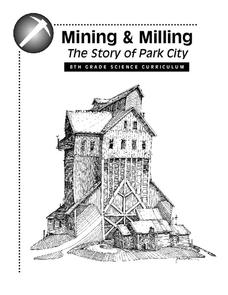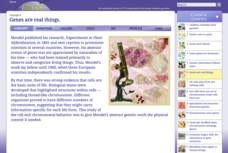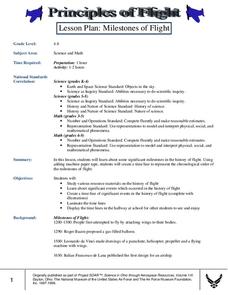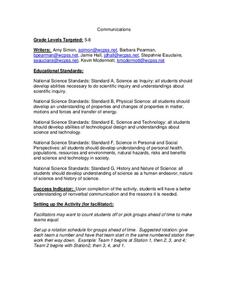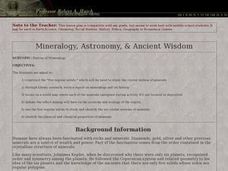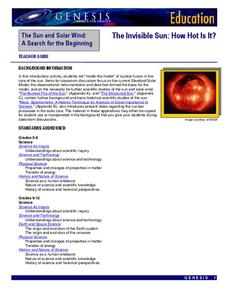Park City Historical Society & Museum
Mining and Milling: The Story of Park City
Study the chemistry of mining! Through nine lessons in the unit, learners explore different concepts related to mining. Their study ranges from rock and mineral analysis to the environmental impact of dynamite and the chemical reaction...
Cold Spring Harbor Laboratory
Genes Are Real Things
Proving microscopic structures exist is a difficult task. Learn how scientists did just that in the mid-1800s as they set out to identify the cellular structures related to genetics. The online lesson explains the collection of work that...
Curated OER
Alaska's Physical Systems and History
Students read about Alaska's physical systems and determine how Alaska's physical makeup has impacted its history. They create timelines of their particular physical system.
Curated OER
Digging, Smelting and Forging: But Why in Pennsylvania
Learners examine the history of the iron industry in Pennsylvania. In this iron industry activity, students learn about Israel Acrilius and his role in the iron industry. Learners identify natural resources used in forging iron. Students...
Curated OER
Europe – Religion and Reformation
Ninth graders examine the Reformation. In this European history lesson, 9th graders explore the 95 theses of Martin Luther and discuss the reaction of the Roman Catholic Church to his ideas. Students then take a quiz based on the lesson.
Curated OER
Era of Self-Sufficiency - Pre-1890
Students investigate the relationship between physical geography and Utah's settlement. In this Utah land instructional activity, students view a PowerPoint about Utah land and work in groups to answer questions about the uniqueness of...
Curated OER
The Invention of the Telegraph
Students study the history of telegraph invention. In this technology lesson, students build their own Morse Telegraph System. They discuss how this invention benefits the society.
Curated OER
Activity Plan Mixed Ages: Sunny Science
Students develop problem-solving, observation, and critical-thinking skills. In this early childhood lesson, students explore the topic of the sun as they notice shadows and light.
Curated OER
Milestones of Flight
Students identify significant milestones in the history of flight. For this aviation history lesson, students study various resource materials and construct timelines of significant achievements.
Curated OER
Ship of the Line
Learners discover boats by researching 18th century ships. In this Naval history lesson plan, students identify and describe the different components of an 18th century naval ship after researching information on the Internet....
Curated OER
Communications
Students incorporate different disciplines into this lesson. In this science lesson, students investigate the use of communicating without words, and how it is different than communicating with words. They discuss the pros and cons of...
Curated OER
Make a Comet Model and Eat It!
Students construct a comet model based on procedure provided. In this space science lesson, students compare the physical properties of comets to the models they made. They record their observations and share them with the class.
Curated OER
Burn, Baby Burn (Or Not)
Physics learners apply the concepts of fluid pressure input and output to firefighting. Divide your class into small groups and give them each a few cards that list nozzle type, hose length, hose size, and structure dimensions, They are...
Curated OER
Defining the Atom
Words, words, words! This presentation uses plenty of them to define the atom, outline the history of what we know about atoms, and explain atomic and mass numbers. That's all! Informative, but not interesting, this slide show would be...
Curated OER
The 1927 Flood
Upper elementary and middle schoolers examine the Great Flood of 1927 in the state of Arkansas. They each prepare an oral report about this flood and the huge impact it had on the economics of that time. Additionally, learners research...
Curated OER
2nd Grade Physical Sciences
Second graders complete activities to measure motion and learn about the Earth's history. In this motion and Earth history lesson, 2nd graders discuss sound and complete a matching sound activity. Students then study the history of Earth...
Curated OER
Rocket Physics
Students investigate the relationship between impulse, momentum, kinetic and potential energy and aerodynamic drag. In this physics lesson, students calculate data taken from launching a rocket. They compare the theoretical and...
Curated OER
Animal Life Histories Derived From Morphology
Young scholars learn the mechanisms of natural selection by deducing information from the physical appearance of the animal.
Curated OER
Mineralogy, Astronomy, & Ancient Wisdom
Students complete a variety of activities surrounding minerals, crystals, and mineralogy. They locate common minerals on a world map, complete a lab in which they identify the chemical and physical properties of various minerals, etc.
Curated OER
Mimicking Nature; Science, Aviation, Flight, Wings
Students consider the relationship between form and flight and investigate the history of man made flight and how wing shape and flexibility affects the maneuverability of an aircraft.
NASA
Photons in the Radiative Zone: Which Way Is Out? An A-Maz-ing Model
Can you move like a photon? Young scholars use a maze to reproduce the straight line motion of a photon. The second in a six-part series of lessons on the sun has learners measure angle of incidence and refraction to determine the path...
NASA
The Invisible Sun: How Hot Is It?
It's getting hot in here! The first in a series of six lessons has learners model nuclear fusion with a simple lab investigation. Groups collect data and analyze results, comparing their models to the actual process along the way.
Curated OER
Sally Ride: Forging a Path to the Stars
Carry on the legacy of the heroic astronaut/educator who spent 30 years nurturing science learning for young girls.
Curated OER
Take a Roller Coaster Ride
Students investigate how roller coasters are built. In this physics lesson, students research the laws of physics that affect roller coaster construction. Students create their own roller coaster design.
